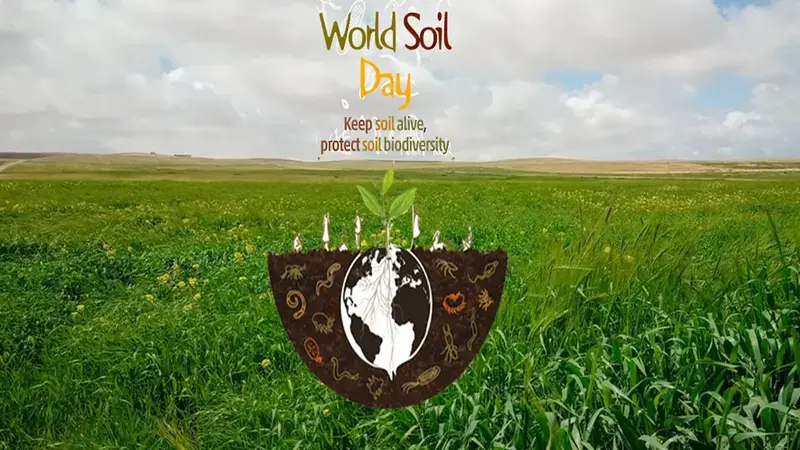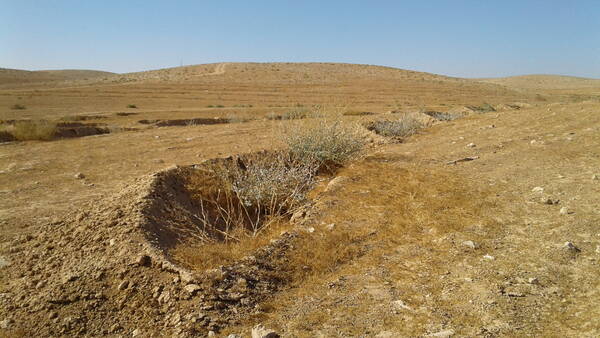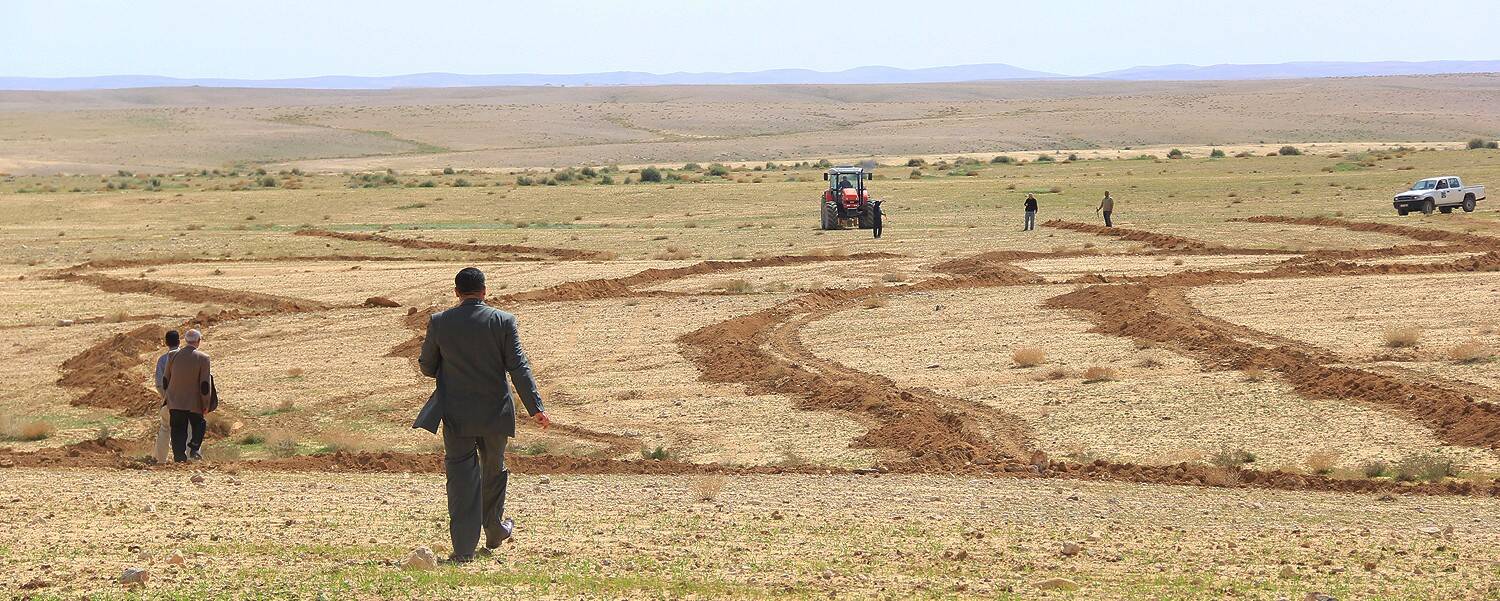Protecting Soil, Protecting People

By Stefan Strohmeier and Vinay Nangia
The theme of this year's World Soil Day, "Keep soil alive, protect soil biodiversity,” helps us to focus on current threats to the vital ecosystem and biodiversity of soil, and what ICARDA and CGIAR are doing in dry regions to protect it.
Just a handful of soil contains the hundreds of thousands of microbes, bacteria and fungi that are the foundation of our ecosystems and food systems all over the world. Yet, soil health, integrity, and resilience are at breaking point, especially in dry regions. Intensive farming, unsustainable agricultural practices and chemical use, coupled with diminishing arable land, pollution, and climate change, create a perfect storm in which soil, life's very backbone, is imperiled.
In the world's drylands, already highly vulnerable to climate change, those threats are magnified, directly endangering agricultural production and food security for the billions of people who live there. Increasing temperatures are associated with higher microbial and insect activity in the soil, helping the proliferation of viruses and bacteria on fields, and endangering crops. Just as devastating are dust storms created by overgrazing and over-cropping that strip the soil of the carbon and nitrogen compounds vital to life, as well as a general mismanagement of water, especially through inadequate irrigation practices which create large salt deposits that choke both soil and crops.
Marginal dryland soils are overexploited, and fast approaching their fragile ecosystem tipping points. Yet there is a lot of well-grounded optimism placed in research for development to better understand the various causes of soil degradation and provide workable solutions to prevent it.
For example in the middle East/Asia region, ICARDA is currently involved in an FAO-funded research project set to increase the understanding of the sand and dust storm (SDS) phenomenon and its impacts on agriculture in the dry areas of Algeria, China, Iran, Iraq, Kuwait, and Mongolia.
Better soil, resilient livelihoods
ICARDA's research teams on soil, water, and vegetation management also work with agro-pastoral communities to protect rangeland health through unique and integrated land, soil, and water conservation technologies. As part of their work, the scientists reintroduce indigenous weed, shrub and tree species to deforested landscapes and establish improved crop-livestock grazing programs that embrace, respect, and protect the diversity and heterogeneity of landscapes and their specific vulnerabilities.
Outside of climate change, droughts, dust storms and soaring temperatures, poorly managed farms of the world's poorest dryland communities are a key driver of land degradation. But the only way to curtail desertification and revive thriving agro-ecosystems and biodiversity is through supporting those communities through delivering better land management solutions.

In Jordan's dry rangelands, ICARDA scientists are combatting ongoing land degradation and rampant desertification to secure local Bedouin communities' livelihoods and tribal heritage. The TRACE Rehab project, supported by the United States Department of Agriculture Forest Service (USDA-USFS), the Arab Fund for Economic and Social Development (AFESD) and the CGIAR Research Program on Water, Land, and Ecosystems (WLE), is a community-based concept striving to revive the vast native Jordanian rangelands ecosystems functions, and produce high yielding field crops through enhanced water-harvesting solutions. In the desert region of the Badia in Jordan, communities have been relying on ‘Marabs’ for centuries to conserve water and plant crops. Marabs, natural formations where water flows over wide stream beds, allow for barley cultivation at the lowest point of the watershed. ICARDA has integrated this ancient water-harvesting technique with new climate-resilient and water-efficient crop varieties and approaches to reverse desertification and boost crop yields.
Too much salt is bad for your health
In the drylands of Central, West Asia, and North Africa (CWANA), many farms rely on irrigated agriculture for cultivation. But poor water management and outdated or dysfunctional drainage systems cause increasing salinization, which carpets soil with salt and decreases crop yields. ICARDA, foreseeing impending soil collapse, is working hard to scale up its proven soil restoration and protection technologies to dryland farmers in this region before it's too late.
Salinization sharply reduces water and land productivity as soils degrade across irrigated croplands, something that Iraq’ landmark salinity project in Iraq aims to redress. Some 75% of Iraq's irrigated area suffers from salinity, and an estimated 25,000 hectares of farmland are abandoned every year and left sterile by elevated salt levels, while Iraqi farmers operating in saline areas lose around USD 300 million a year in income due to salinity.

Designed for the Iraqi government and local farmers by an ICARDA-led consortium of international agencies, the Iraq Salinity Project tackled the growing problem of salt-laden soils in Iraq. Its goal was to ensure the country's long-term food security by assessing the extent of the country's soil salinity and providing tools, capacity building, and technical support to Iraqi government agencies and agricultural services.
Research-for-development for climate-smart rural livelihoods
ICARDA researchers develop and disseminate practical, low-cost options to protect soil and water resources, using a people-centered community-led approach that integrates technologies such as climate-smart crops alongside new, and ancient, land, soil, and water management techniques. Farmers are involved at every stage, from planning and implementation to dissemination of results. Working like this means that ICARDA innovations are more likely to work because they are tailored to specific settings and needs, while being informed by vital local knowledge.
World Soil Day is a reminder that time is running out to safeguard soil health. Yet with more funding for research and collaboration between ICARDA’s dryland experts, other CGIAR centers, global institutions including from the countries where we work, and most importantly, the farmers themselves, degraded lands can still be revitalized. If enough funding targets research for development projects, then there is hope to salvage our soils and ensure the viability of long-term food security in the drylands and beyond.
ICARDA's Water & Soil Management Program
-----------------------------

Dr. Stefan Strohmeier is ICARDA Associate Scientist for Soil and Water Conservation and Management

Dr. Vinay Nangia is ICARDA Research Team Leader – Soil, Water and Agronomy
